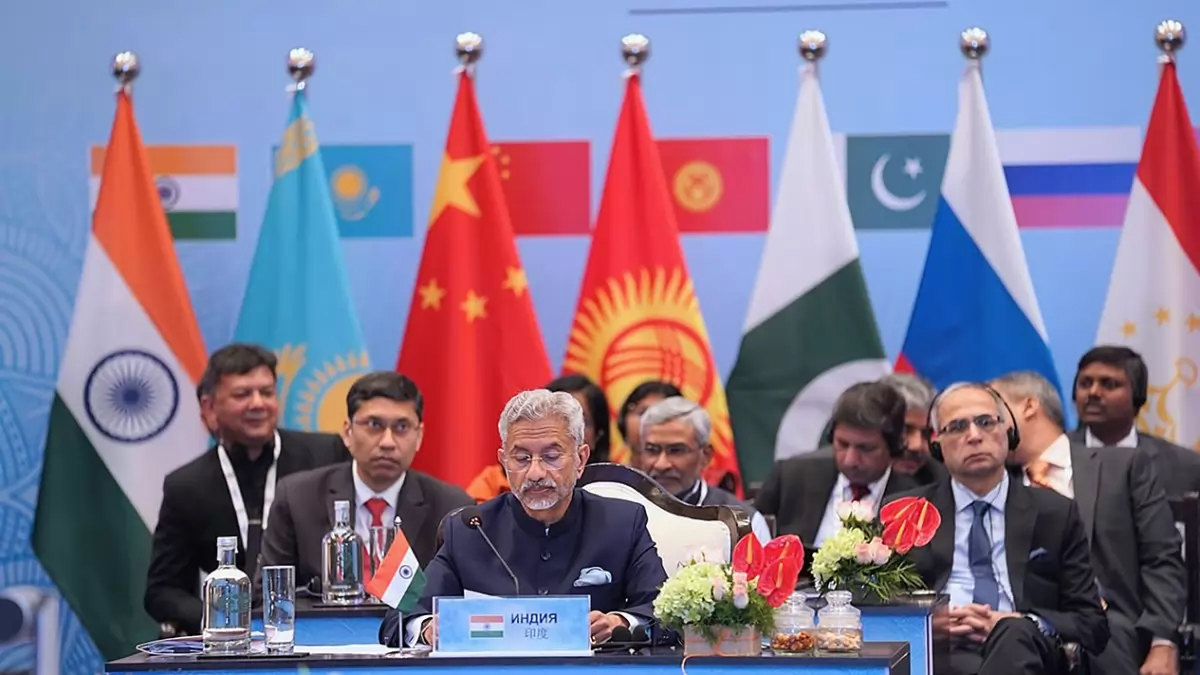An indirect jab at Pakistan was made by India’s foreign minister when he said that avenues for funding terrorists “must be seized and blocked without distinction” during a meeting of the Shanghai Cooperation Organization on Friday.
Additionally, the SCO pushed towards adding new “dialogue partners,” including military-ruled Myanmar, as External Affairs Minister S. Jaishankar cautioned that several worldwide crises had weakened confidence in international organizations.
In his opening remarks at the SCO foreign ministers conference in the western Indian state of Goa, Jaishankar stated, “We firmly believe that there can be no justification for terrorism and it must be stopped in all its forms and manifestations, including cross-border terrorism.” It is not necessary to remind members that one of the SCO’s founding purposes was to combat terrorism.
There was no question that Jaishankar was criticizing Pakistan, a fellow SCO member whose foreign minister, Bilawal Bhutto Zardari, attended the conference. India frequently holds Islamabad responsible for funding cross-border terrorism in Kashmir, which has long been the source of hostility between the two nuclear-armed neighbors.
There are some strange bedfellows in the China-led SCO, which is being hosted by India for the first time this year. Along with Pakistan, Beijing and New Delhi are at war with one another over the Himalayan frontier, where fatal hand-to-hand fighting occurred in 2020.
Jaishankar tweeted on Thursday that he and Chinese Foreign Minister Qin Gang had a thorough talk about their bilateral ties. The focus is still on finding solutions to pressing problems and maintaining calm in border areas.
On Friday, Qin was reported by China’s official news agency, Xinhua, as saying that China was eager to strengthen coordination and cooperate with India on global and regional issues.
Ministers arrived in Goa on Thursday for the SCO summit, which came after a related session of the organization’s defense leaders late last month. India also attacked Pakistan there without naming any individuals while openly discussing the boundary with China.
But this time, the drama was heightened by Bhutto Zardari’s actual presence in Goa. Online attendance from Islamabad at the last defense ministers’ meeting.
The visit by Bhutto Zardari was Pakistan’s first foreign minister to India since 2011. A high-ranking Islamabad official last traveled to India in 2014, when Nawaz Sharif, the prime minister of Pakistan at the time, participated in Narendra Modi’s inauguration.
Jaishankar greeted Bhutto on Friday by uniting his hands in the Indian greeting of “namaste,” which is used to welcome someone. Zardari Bhutto returned the favor. According to sources, the two shook hands on Thursday night during a dinner that New Delhi hosted but to which the media was not invited.
It was not anticipated that Jaishankar and Bhutto Zardari would speak privately.
Bhutto Zardari, for his part, informed his SCO colleagues on Friday that his presence in Goa was the clearest sign yet of the significance Pakistan accords to the organization. He added in regards to terrorism, “Let’s not get caught up in weaponizing terrorism for diplomatic point scoring.”
He said, “I and my country are firmly committed to being part of regional and global efforts for eradicating this menace,” according to the transcript of his speech released on Pakistan’s Foreign Ministry website.
On Friday, he and Jaishankar did seem to connect on some level. They both urged the Taliban in Afghanistan to ensure a representative government and protect the rights of women and minorities, joining Sergey Lavrov of Russia in this appeal. According to Bhutto Zardari, the Afghan government must continue to be urged by the international community to adopt globally recognized principles of political inclusion and respect for all Afghans’ rights, particularly the right of girls to an education.
China, Kazakhstan, Kyrgyzstan, Russia, Tajikistan, and Uzbekistan created the SCO in Shanghai in 2001. India and Pakistan were admitted as full members in 2017 as part of the organization’s initial growth.
Memorandums of Understanding on the awarding of the grouping’s dialogue partner status to Kuwait, the Maldives, Myanmar, and the United Arab Emirates were signed outside of this week’s summit. According to a statement posted on the SCO website on Saturday, the memoranda were signed with Zhang Ming by the envoys of the four nations to India.
Countries with dialogue partner status are eligible to attend SCO activities when invited by member states. The SCO has four observer states, including Afghanistan, Belarus, Iran, and Mongolia, in addition to six additional such partners, including Armenia, Azerbaijan, Cambodia, Nepal, Sri Lanka, and Turkey. Jaishankar said that the SCO foreign ministers evaluated the status of Belarus’ and Iran’s membership applications.
India, according to Jaishankar, places “great importance” on the SCO’s expansion of diverse cooperation. The term “SECURE,” which stands for security, economic growth, connectivity, unity, respect for sovereignty and territorial integrity, and environmental preservation, was used by Prime Minister Modi to describe India’s aspirations for the SCO.
Indirectly, the Indian minister also alluded to the conflict in Ukraine. “The world is facing a multitude of challenges today as a result of the COVID-19 pandemic and geopolitical upheavals,” he stated. The supply of electricity, food, and fertilizer has all been seriously impacted by these occurrences, which have had a domino effect on developing countries.
According to him, these crises have also shown that there is “a credibility and trust deficit in the ability of global institutions to manage challenges in a timely and efficient manner.”
However, he claimed that the same difficulties give SCO members a chance to work together. Because the SCO includes more than 40% of the world’s population, our collective actions will undoubtedly have international influence.
At a press conference later that evening, which was also attended by the visiting Pakistani media, Jaishankar addressed a number of inquiries on Pakistan, including those pertaining to the country’s foreign minister’s comments on terrorism.
“Bhutto Zardari’s] positions were called out and countered, including at the SCO meeting itself, as a promoter, justifier, and, I’m sorry to say, spokesperson of a terrorism industry, which is the mainstay of Pakistan.”
“Terrorist offenders and victims do not converse about terrorism together.” In answer to a question regarding Islamabad requesting that the two sides discuss battling the scourge, he said, “Victims of terrorism defend themselves, counter acts of terrorism, they call it out, they delegitimize it, and that’s precisely what’s occurring.” “On the subject of terrorism, I’d say Pakistan’s credibility is eroding even more quickly than its foreign exchange reserves.”
The situation along the two nations’ border was described as steady in the Chinese readout of the Qin-Jaishankar meeting on Thursday. Jaishankar responded by stating that “there is an abnormal position in the border areas… and we had a very frank discussion about it.”
If the calm and tranquility in the border areas are disturbed, Indian-Chinese ties are not normal and cannot be normal, he continued.





